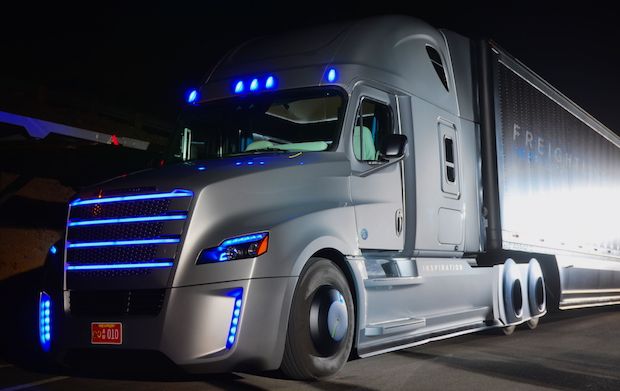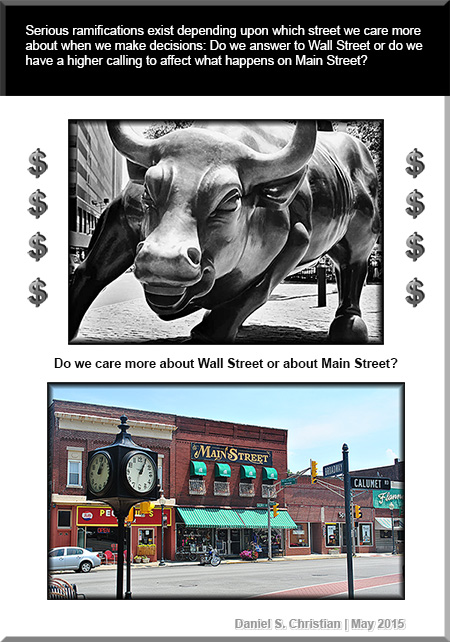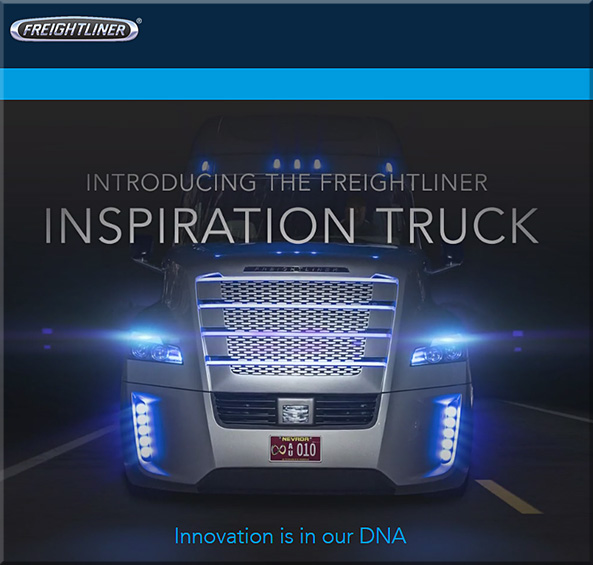From DSC:
This posting is not meant to pick on Freightliner or any other particular company. But the articles listed below (not to mention many other articles re: Google’s self-driving car or re: other technologies) caused me to reflect upon the ramifications of our decisions. The articles made me reflect upon the heart of capitalism and how/why we make the decisions we do within our corporations. That is, what happens when our corporations answer to Wall Street but not to Main Street? What are the ramifications to us, to our neighbors, to our neighborhoods, and to our nation? For that matter, to our very future?
And the topic is far bigger than self-driving trucks. The replacement of people with technology has been going on for quite some time. Modern day examples include ATM machines, self-service scanners/checkouts at the store, telephone switches and automatic voice response units, and more.
Readers of this blog will know that I’m generally pro-technology and that I see technologies as tools. However, replacing people with technologies at the pace that we’re seeing these days causes me to seriously pause…especially when jobs/humans seem to be being replaced far faster than new jobs are being created.
Freightliner unveils first autonomous semi-truck licensed to drive itself on highways — from spectrum.ieee.org by Evan Ackerman

Excerpt:
[On May 5, 2015], Freightliner introduced the world to its Inspiration truck, a prototype for the first semi-truck capable of fully autonomous highway driving that’s been officially licensed to operate on public highways in Nevada.
Mercedes shows off self-driving “Future Truck 2025” — from spectrum.ieee.org by Philip E. Ross
From DSC:
Hmm…though this truck looks like some incredible engineering, I’m more interested in addressing the overall trend here…and it’s a very troubling trend indeed. I say troubling because I see our corporations much more inclined towards answering to Wall Street, but not so much to Main Street. If the incentive is to maximize value for investors — regardless of the costs to society at large — then we as a nation could end up with far larger societal issues than we’ve ever encountered before.
If we answer to Wall Street, we will chose the less expensive algorithm or robot every time.
For example, if more lower and middle class jobs disappear, and people are out of work…downward spirals could start happening all over the place (and as you’ll see below and in many other articles out there, the trend of automation, robotics, algorithms, and other technologies replacing people isn’t limited to blue collar positions). People could get discouraged after not being able to find jobs. The rising cost of college and getting re-trained may be out of reach for many. Despair could set in along with increased use of drugs — addictions, crime, and violence could become more prevalent. Such things could lead to more broken families, increased incarceration, etc. These types of situations, in turn, would bring more costs in a variety of ways to our nation. Issues that could quickly have inter-generational, long-lasting impact.
The replacement of jobs is at all levels and covers white collar positions as well. For example, also see:
- 5 white-collar jobs robots already have taken – from fortune.com by Erik Sherman
Artificial intelligence, robotics and new disruptive technology are challenging white-collar professions that previously seemed invulnerable:
Financial and Sports Reporters
Online Marketers
Anesthesiologists, Surgeons, and Diagnosticians
E-Discovery Lawyers and Law Firm Associates
Financial Analysts and Advisors
. - The new bookkeeper is a robot — from by Vipal Monga
In corporate finance departments, software does tasks that once took armies of people
. - Automation replacing service, white-collar workers — from daytondailynews.com by Dave Larsen
Excerpt:
Robots and artificial intelligence are rapidly moving beyond the factory floor to new roles in service industries, which account for four out of five U.S. jobs. Many agricultural and manufacturing workers already have been replaced by machines that work faster and more efficiently, and other occupations, including some white-collar jobs, will soon follow, experts said.
.
So the above articles made me reflect on the heart of capitalism and what is driving it for us. If we answer to Wall Street, we will chose the less expensive algorithm or robot every time. But if we stop and think about the costs of getting rid of too many jobs too quickly, we may want to temper things a bit and either provide more resources for helping people get re-tooled for a new job and/or we could decide not to go with that algorithm or that robot after all.
This posting won’t go into other possible solutions. But if you are interested in obtaining further information on this trend and for further thoughts/potential solutions re: it, see the work of Erik Brynjolfsson and Andrew McAfee.

It’s important to note that this isn’t just a problem for someone else to deal with; we’re all in this boat together. “No man is an island” — a saying that still rings true.
———-
Additional questions:
- What do these trends mean for how we educate our children? Our young adults?
- What do these trends mean for remaining marketable over a lifetime?
- How do these things affect higher education — our curricula, programs, degrees, and certificates?
- How will these things affect alternative forms of credentialing?
———-
Addendums:
- Is your job creative enough to resist robot automation? — from blogs.wsj.com by Amir Mizroch
- Why isn’t the tech boom helping the economy? — from linkedin.com by Nishant Bhajaria
- The near future of artificial intelligence and smart machines in community banking — from independentbanker.org by Elizabeth Judd
- New machine could one day replace anesthesiologists — from washingtonpost.com T
- We need new jobs as the machines do more of our work — from theconversation.com by David Tuffley
- More STEM education won’t protect our jobs from robots — from phys.org by Toby Walsh
- Bad news for IT: Robots and artificial intelligence will take jobs — from zdnet.com by Greg Nichols
In his new book, Rise of the Robots, Martin Ford argues that a bleak jobless future awaits if we don’t take action. Fortunately, he gives us a way forward.
- Revolution in the Driver’s Seat: The Road to Autonomous Vehicles — Boston Consulting Group / bcgperspectives.com
- Does Artificial Intelligence Pose a Threat? — from wsj.com by Ted Greenwald
A panel of experts discusses the prospect of machines capable of autonomous reasoning
Excerpt:
- 14 Surprising Jobs That Robots Are Doing — from jobs.aol.com
Actors? Waiters? The next machine age is coming. - Robots threaten these 8 jobs — from money.cnn.com
Soon you could be competing with a robot for a job.
Addendum on 7/15/15:
- Here’s How Managers Can Be Replaced by Software — from hbr.org by Devin Fidler











[…] From DSC: * These are the types of concerns I was trying to get at when I asked the question: Which street do we care more about, Wall Street or Main Street? […]